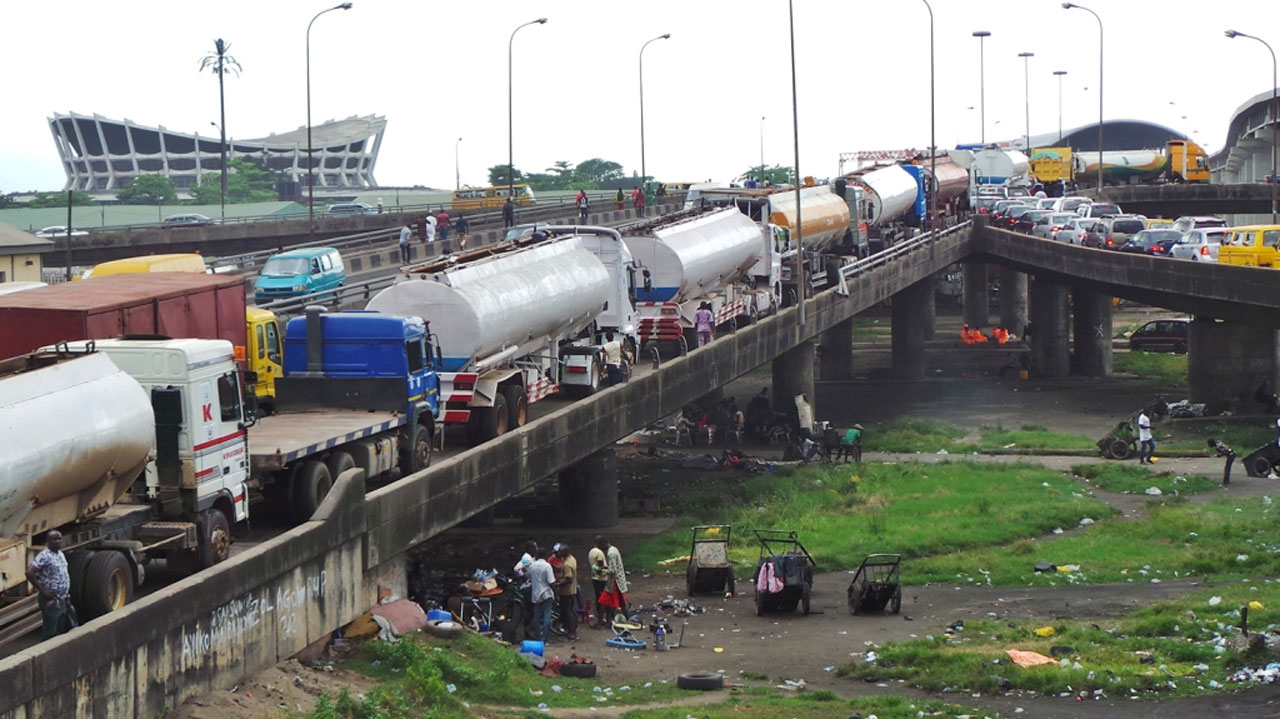What used to be a friendly gesture has now metamorphosed into daylight robbery, and there’s no law enforcement agency to call on as Naval officers, Civil Defence and Army officials deployed to control traffic at the frustrating Apapa gridlock now exploits tanker drivers and other motorists who do business at the ports.
National Daily gathered that taskforce, comprising Navy officials, Custom officers, Civil Defence, and Army officials, who operates ruthlessly, collect their share of payments from drivers of the containers and trucks.
These are non-arms carrying officers whose responsibility is to guard the Apapa Ports; that is where their jurisdiction begin, and that is where it’s expected to end. But corruption has extended their jurisdiction and added extra to their responsibilities.
They break windscreens and beat up drivers (they once allegedly chased a driver to his death) all for the unlawful charges which all security agencies within the taskforce lay claim to. While some of the agencies don’t come directly to make their demands, they have plainclothes men demanding these charges on their behalf, and only God can protect the driver or manager who protests against them publicly.
Findings by National Daily revealed that each security agency takes its turn while drumming up illegal charges for which there are no receipts, just papers that are subject to renewal based on the duration placed on them by the port authority. It was disclosed that these papers serve different purposes: for entry and loading.
From the Apapa Bridge to the Area B police station, Nurudeen Opeyemi, one of the container drivers, says that he and his manager have already spent about N80, 000 and they’ve been on the road for about two weeks trying to gain access into the APM Terminal to load their container. While on exit from the Apapa road, they settle with about N500 per security officer that makes request.
According to Opeyemi, a particular form, ‘Call-up paper’ which used to be sold to them for about N2,000, now goes for N10,000, with other hidden extra charges around it — a fee is demanded to get it signed, another fee is demanded to submit it. If they are lucky, the officials will not reject the paper, and request a new one.
The paper has an unwritten expiration date decided by the NPA officials, who will demand another payment once they believe the expiration date has passed. This happens to most papers collected by the port drivers.
While the payment is illegal with no receipt to prove such payment (asides the papers given to them which don’t state the amount paid for it, just words and signatures), the payments made to all security agencies afford the drivers a security officer (be it Navy or Army) who will escort them to the port and facilitate their loading.
In the case where the officer given to them as escort is considered low in rank by the NPA security, they are bound to restart their journey, which contributes to the days spent on the road and the increased amount charged by the security agencies whose initial job is to control traffic, and secure lives and properties.
Ibrahim Olawale is also one of the managers of the containers on Apapa road, and he echoes the same thoughts of Opeyemi regarding the activities of the taskforce on the Apapa road. But asides that, he brings a new twist to the formation of the story, while airing his thoughts regarding those involved in the illegal charges.
While noting all the security agencies involved in the illegal charges, he drew a link between the Lagos State Government and the taskforce. The government is accused of indirectly getting its cut from the charges, which is why he feels the illegal activities will continue without checks.
Olawale said that the problems on the road are NPA, Navy and AP Moller. The staff of AP Moller who are in charge of the terminal are responsible for the slowdown of loading due to their attitude towards work.
Adding that there’s a paper called ‘booking’, if work goes as required, the booking won’t expire. He explained that someone can re-validate three times within one day without loading his goods.

 Inspirational1 week ago
Inspirational1 week ago
 Featured6 days ago
Featured6 days ago
 Crime6 days ago
Crime6 days ago
 Featured7 days ago
Featured7 days ago
 Business5 days ago
Business5 days ago
 Editorial3 days ago
Editorial3 days ago
 Business2 days ago
Business2 days ago
 Featured2 days ago
Featured2 days ago

